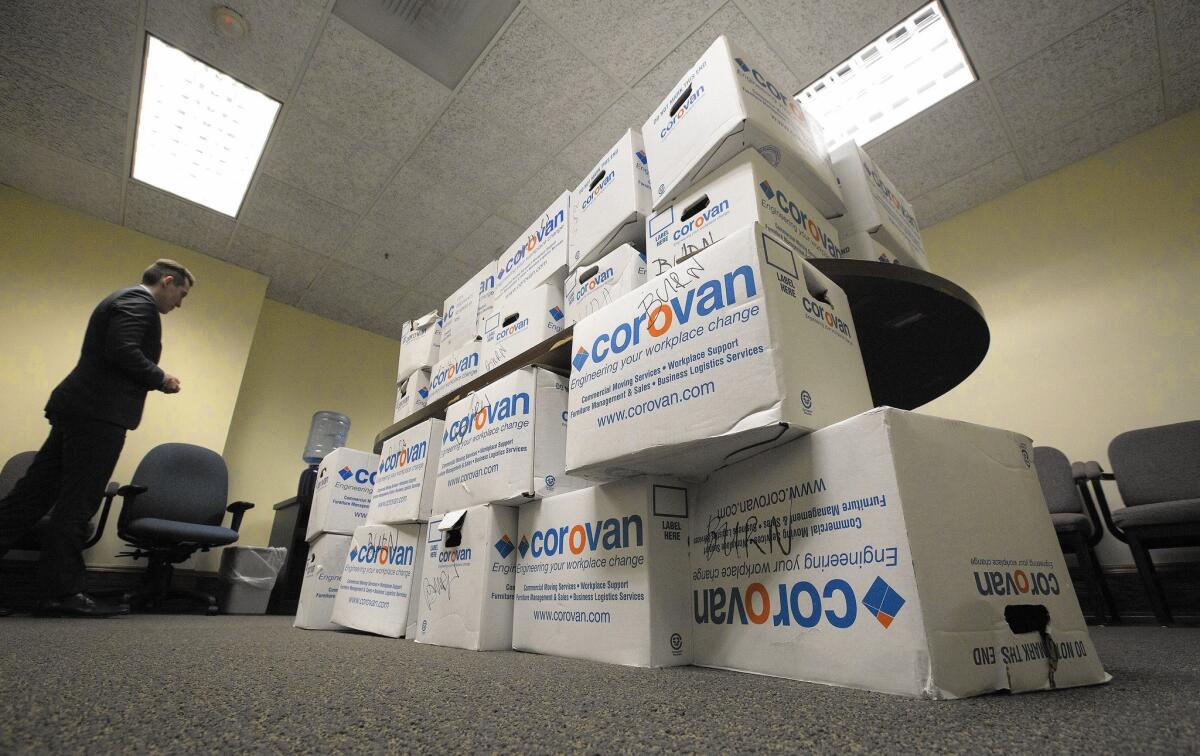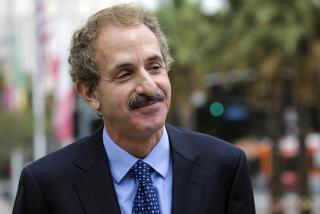Documents ex-L.A. councilman sought to destroy are made public by successor

Dozens of boxes of office documents that former Los Angeles City Councilman Tom LaBonge and his staffers sought to destroy were instead made available Friday by his successor.
The records included planning files, letters and piles of travel receipts related to Sister Cities, a global cultural exchange program that pairs Los Angeles with other cities that had come under fire during a recent campaigns.
Also among the salvaged documents were old lists of election donors, which drew scrutiny from some attorneys. L.A. city officials and employees are prohibited from campaigning, fundraising or doing campaign research during their work hours, or in city offices not available to the public for campaign activities.
LaBonge, who said he didn’t have time to review the documents Friday, said he had “absolutely not” worked on his campaigns at his City Hall office.
The papers had been bound for the shredder: LaBonge staffers sent off 113 boxes to be destroyed when he left office last year, according to city records. The former councilman said no one had told him to save anything and any important documents would be available elsewhere.
Dozens of those boxes were recovered by a city attorney before they could be destroyed and later sent to Councilman David Ryu, whose staff deemed them to be public documents and made them available Friday. Ryu had complained that LaBonge left him no files when he took office.
The documents included a printed table labeled “LaBonge No Money So Far” that listed people and dollar amounts for “Re-elect07” and “Officeholder06.”
It had a written note attached that read, “Jeanne / Let’s talk at lunch – see me / Tom.” Former LaBonge staffer Jeanne Min, who now works for another councilman, said in an email that she did not talk with LaBonge about campaigning in the office or during work hours and did not recall discussing the document.
Another printed table was labeled “Tom LaBonge Contributors 2001-2013” and listed thousands of people and the “Amount Rcvd.” And the documents also included a 2003 email from campaign consultant Sue Burnside, titled “tom requested a list of the endorsers- here it is,” sent to his wife and an aide on their personal email.
Stephanie Scher, a retired attorney living in Los Feliz who has raised concerns about records being destroyed, said LaBonge needs to explain why the campaign documents were there, adding they “should be at a campaign office.”
However, Burnside, who worked on several campaigns for LaBonge, said she had never seen the former councilman violate the city rules. The fact that such papers were trashed “doesn’t mean we can show anything other than he threw the papers away in a city garbage can,” said Gary Winuk, former enforcement chief for the Fair Political Practices Commission.
The boxes released Friday also included piles of old receipts for trips tied to the Sister Cities program, including hotel bills and airline tickets for LaBonge and some former staffers.
Reporters had sought information about Sister Cities amid a campaign controversy: During the race last year between Ryu and LaBonge’s former chief of staff, Carolyn Ramsay, LaBonge frequently faced criticism for his spending, including money allocated to the Sister Cities nonprofit by his office. As a councilman, LaBonge had served as chairman of Sister Cities and traveled around the globe with the group. His aide Kamilla Blanche served as its executive director.
Seventy-eight other boxes that LaBonge staff sent out for destruction were probably destroyed, said Todd Gaydowski, who oversees city records management.
The missing files have raised questions about whether Los Angeles, which lacks city rules on what departing council members do with their files, is in line with state laws that limit when public records can be destroyed. California law generally allows city governments to destroy some records if lawmakers and the city attorney approve, but not unduplicated records less than 2 years old.
Follow @LATimesEmily for breaking news for L.A. City Hall
ALSO
Open-air urinals in S.F. park ‘disgusting,’ critics say
Doctor convicted of murder for patients’ overdoses gets 30 years to life in prison
Taiwan earthquake topples buildings, leaving at least 7 dead and hundreds injured
More to Read
Start your day right
Sign up for Essential California for news, features and recommendations from the L.A. Times and beyond in your inbox six days a week.
You may occasionally receive promotional content from the Los Angeles Times.







